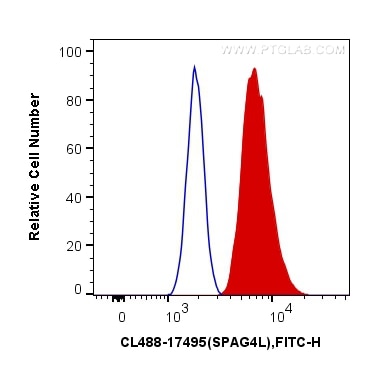- Featured Product
- KD/KO Validated
SPAG4L Polyklonaler Antikörper
SPAG4L Polyklonal Antikörper für FC (Intra)
Wirt / Isotyp
Kaninchen / IgG
Getestete Reaktivität
human, Maus
Anwendung
FC (Intra)
Konjugation
CoraLite® Plus 488 Fluorescent Dye
Kat-Nr. : CL488-17495
Synonyme
Geprüfte Anwendungen
| Erfolgreiche Detektion in FC (Intra) | PC-3-Zellen |
| Erfolgreiche Detektion in FC | PC-3-Zellen |
Empfohlene Verdünnung
| Anwendung | Verdünnung |
|---|---|
| Durchflusszytometrie (FC) (INTRA) | FC (INTRA) : 0.40 ug per 10^6 cells in a 100 µl suspension |
| Durchflusszytometrie (FC) | FC : 0.40 ug per 10^6 cells in a 100 µl suspension |
| It is recommended that this reagent should be titrated in each testing system to obtain optimal results. | |
| Sample-dependent, check data in validation data gallery | |
Produktinformation
CL488-17495 bindet in FC (Intra) SPAG4L und zeigt Reaktivität mit human, Maus
| Getestete Reaktivität | human, Maus |
| Wirt / Isotyp | Kaninchen / IgG |
| Klonalität | Polyklonal |
| Typ | Antikörper |
| Immunogen | SPAG4L fusion protein Ag11629 |
| Vollständiger Name | sperm associated antigen 4-like |
| Berechnetes Molekulargewicht | 379 aa, 43 kDa |
| Beobachtetes Molekulargewicht | 43 kDa |
| GenBank-Zugangsnummer | BC026118 |
| Gene symbol | SPAG4L |
| Gene ID (NCBI) | 140732 |
| Konjugation | CoraLite® Plus 488 Fluorescent Dye |
| Excitation/Emission maxima wavelengths | 493 nm / 522 nm |
| Form | Liquid |
| Reinigungsmethode | Antigen-Affinitätsreinigung |
| Lagerungspuffer | PBS with 50% glycerol, 0.05% Proclin300, 0.5% BSA |
| Lagerungsbedingungen | Bei -20°C lagern. Vor Licht schützen. Nach dem Versand ein Jahr stabil. Aliquotieren ist bei -20oC Lagerung nicht notwendig. 20ul Größen enthalten 0,1% BSA. |
Hintergrundinformationen
SPAG4L,also named as SUN domain-containing protein 5 or Testis and spermatogenesis-related gene 4 protein, is a 379 amino acid protein, which contains 1 SUN domain. SPAG4L is widely expressed and localizes in the nucleus inner membrane. SPAG4L is restricted to the apical nuclear region of round spermatids that face the acrosomic vesicle. SPAG4L is involved in linkage of the acrosomic vesicle to the spermatid nucleus, and in acrosome biogenesis.
Protokolle
| PRODUKTSPEZIFISCHE PROTOKOLLE | |
|---|---|
| FC protocol for CL Plus 488 SPAG4L antibody CL488-17495 | Download protocol |
| STANDARD-PROTOKOLLE | |
|---|---|
| Klicken Sie hier, um unsere Standardprotokolle anzuzeigen |


